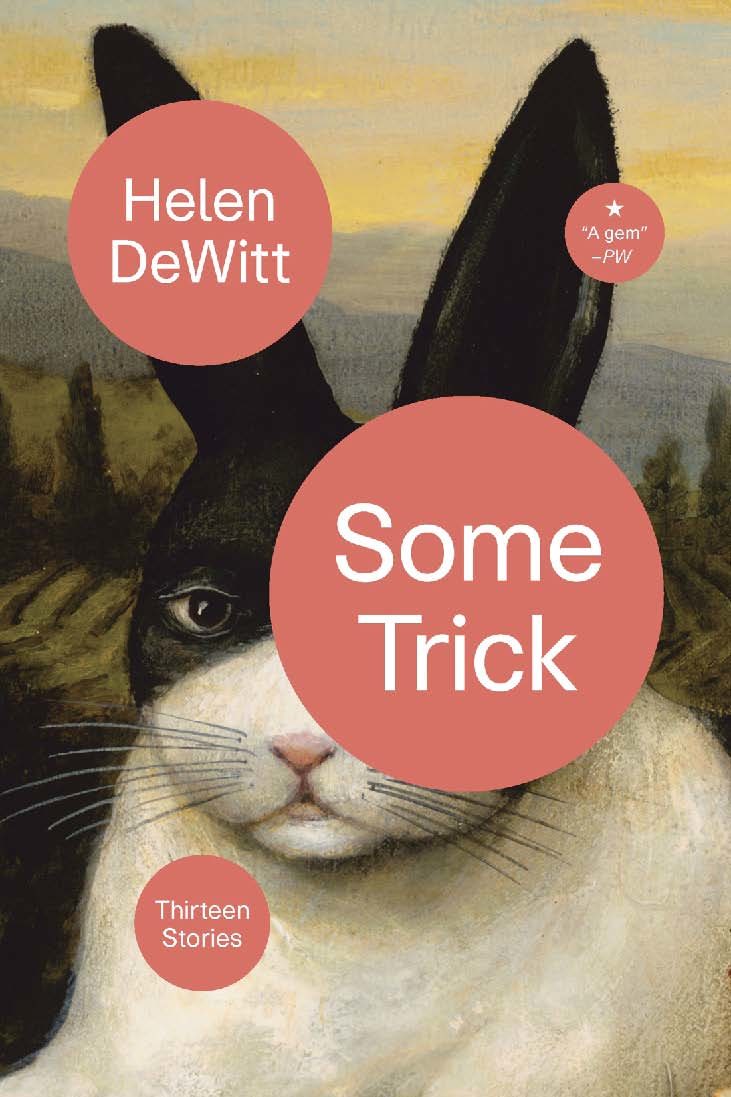Some Trick
by Helen DeWitt
reviewed by Greg Chase
In “Climbers,” one of the strongest stories in Helen DeWitt’s new collection Some Trick, a man strikes up a conversation with a woman in the gift shop of the Van Gogh Museum in Amsterdam. He has been eyeing her while they looked at the art but has kept his distance, thinking she might prefer to be alone as she contemplates the work of this “crazy guy [ … ] who never sold any paintings.” The gift shop, meanwhile, seemed like a “space designed to ease the transition to the world of men”—and, hence, a good place to try his hand at charming a fellow lover of Dutch Post-Impressionism.
Much of Some Trick’s smartest and best writing concerns this movement from painting to gift shop. DeWitt writes perceptively, hilariously, and often quite poignantly about the tension between making art and marketing art. More than half of the collection’s thirteen stories feature some sort of contractual negotiation. Her cynical portrayals of “hot shot” literary agents are clearly informed by her own frustrating experiences with the publishing industry, including her dismay at the overly aggressive copyediting of her brilliant first novel, The Last Samurai, and her lengthy struggle to find a publisher for her second, the darkly satirical Lightning Rods. In “Climbers,” the central figure is Peter Dijkstra, a Dutch writer who has built a cult following in the U.S. on the strength of some shorter works, though his novels remain untranslated. Some NYC-based writers put him in touch with an agent, with whom Dijkstra reluctantly corresponds, recognizing that “if you want [ … ] words in a notebook to be a solution to credit card debt, there is a bridge that has to be crossed.” After reading a snippet of the writing Dijkstra has done in English, the agent proclaims that he has “the next 2666” on his hands. Meanwhile, the writers who had set out to promote Dijkstra in the first place worry they are helping to “destroy the thing they loved.”
The opening story, “Brutto,” offers a variation on this theme: a painter gets offered £50,000 to design hideous clothing and agrees to take on the project because she needs the money. After the first exhibition, her financial backer tells her, “We have to be more explicit. [ … ] It’s about the body. Hatred of the body.” Maybe, he suggests, “she could get really drunk so they could use the vomit.” The painter thinks: “If you have never been there you think it is easy to walk away.”
Another story, “My Heart Belongs to Bertie,” features a mathematician and writer of children’s books who has trouble getting his agent to understand his intellectual commitments, finding more success communicating with his imaginary friends (who happen to be robots). This story also grapples with questions of probability, another of the collection’s key motifs, with the mathematician censuring the “barbarous” lottery system by which children are assigned, for life, to a single set of parents. In a prefatory note, DeWitt writes of “the gap between people who see why understanding chance matters and people who just don’t get it—people who don’t see why this is crucial to the most basic questions of ethics.” She returns to this topic in a later story, “Stolen Luck,” about a tabloid journalist who displays as little concern for probability as he does for ethics, but still manages to win a lot of money playing poker. (After all, DeWitt reminds us, that’s how probability works: the unlikely outcomes happen sometimes too.)
Readers familiar with DeWitt’s novels will be pleased to find her sardonic wit and verbal virtuosity on display in many of these stories. She comes up with a great way to say that a character sits in a bar doing nothing: “Marc occupies his suit.” She uses the passive voice to comedic effect to describe the indignity of receiving constructive criticism: “Eloise had written a book and been made to have discussions in which the phrase ‘flesh out’ was used of characters.” She provides academic commentary at once erudite and bizarre, as when one polyglot comments: “It’s interesting, everyone knows that Perec’s La disparition is a book in which the letter e does not appear, but Rabbit, Run is never mentioned as a companion piece in which the letter å does not appear. Ångstrom being the correct spelling of the surname of the eponymous protagonist.”
In a collection that returns repeatedly to a handful of favored topics, it is probably inevitable that some treatments of the main subject matters will be more successful than others. Many of Some Trick’s characters feel one-dimensional, and in multiple stories, an improbable turn of events provides neat narrative resolution, a kind of joke that quickly loses effectiveness when over-used. All the same, Some Trick confirms DeWitt’s status as one of the wittiest, most innovative writers working today, someone whose talent for lampooning cliché is matched by the brilliant originality of her best sentences.
Published on April 11, 2019

